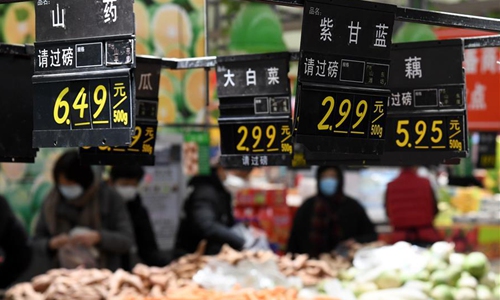HOME >> CHINA,SPECIAL-COVERAGE
Virus won't help return jobs to US: experts
By Yin Yeping, Wang Sheng and Qi Xijia Source:Global Times Published: 2020/1/31 21:58:27

People buy vegetables in a supermarket in Qingdao, east China's Shandong Province, Jan. 29, 2020. To ensure the supply of vegetables during the fight against novel coronavirus in Qingdao, the local government has put vegetable reserves in the market. Photo: Xinhua
An outlandish comment by US Commerce Secretary Wilbur Ross, which counted the deadly coronavirus outbreak as a reason for the global supply chain relo-cation and channeling more jobs back to the US, has drawn harsh criticism from netizens and experts on Friday.
Mei Xinyu, an outspoken expert close to China's Commerce Ministry, said Ross' comments amount to "terrorism."
In an interview with Fox Business on Thursday, Ross said diseases like the Wuhan coronavirus, which has killed more than a hundred people and sickened thousands, were "another risk factor that people need to take into account" when considering where to locate operations.
"I don't want to talk about a victory lap over a very unfortunate, very malignant disease. But the fact is, it does give businesses yet another thing to consider when they go through their review of their supply chain," the US minister said.
"It's understandable in Ross' capacity as the US com-merce minister to lure manufacturers back, but it's not going to happen," Mei said. "The reality is that China possesses a productivity and cost advantage that the US and Mexico do not."
"This is one of the coldest, most malevolent things I've ever heard," one Twitter user named Nancy M said.
"It will do no such thing. Factories aren't built over-night. Supply chains aren't made overnight. No one is moving factories from China back to the US. They're going to the lower cost countries elsewhere in Asia. Coronavirus won't have any impact on long term re-patriation," another Twitter user named "lawhawk" said.
The World Health Organization declared a public health emergency of international concern over the global outbreak of 2019nCoV on Thursday, raising wider concerns about its possible impact to the Chi-nese and the world economy.
Many retail chains, from H&M and IKEA to Starbucks and Apple, have temporarily closed their stores or shortened store hours in China.
Cong Yi, a professor at the Tianjin University of Fi-nance and Economics, told the Global Times on Friday that Ross' nationalist comment at this time is aimed at stirring emotions, and not something a rational politician would say.
"It is time for a global response to the outbreak, the relationship between China and the United States should be a cooperative one, not a competitive one," Cong said.
"Will the US need China's cooperation if there is an outbreak out there?" Cong said, noting that China also needs a great deal of American medical products.
Wu Yabin, a global supply chain expert at the University of International Business and Eco-nomics, told the Global Times the WHO classifi-cation won't change China's status as the world's second most preferred destination for foreign in-vestment.
"China's complex industrial chain means any at-tempt to relocate out of China in a short period of time will be futile, which is why most multinational firms choose to retain their core manufacturing capacity within China amid the China-US trade war," Wu said.
It is also a prevailing trend that manufacturers will put their production facility near to the de-mand and China is where much of that demand will come from, Wu noted.
Tang Jianwei, a senior macroeconomic analyst at the Bank of Communications, said there is uncertainty about US' growth opportunities because the world's two largest economies are so much intertwined.
"If China's economy is more affected by the outbreak, so will the US'," he said.